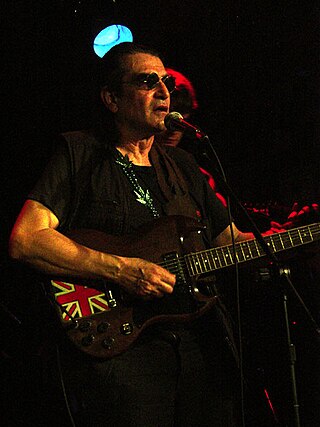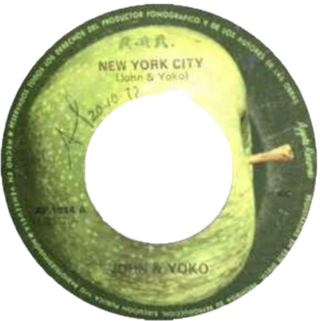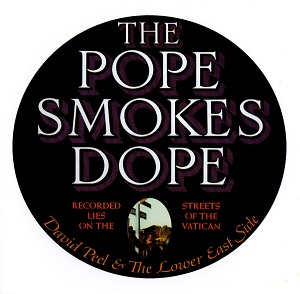Related Research Articles

Yoko Ono is a Japanese multimedia artist, singer, songwriter, and peace activist. Her work also encompasses performance art and filmmaking.
Apple Records is a British record label founded by the Beatles in 1968 as a division of Apple Corps Ltd. It was initially intended as a creative outlet for the Beatles, both as a group and individually, plus a selection of other artists including Mary Hopkin, James Taylor, Badfinger and Billy Preston. In practice, the roster had become dominated by the mid-1970s with releases of the former Beatles as solo artists. Allen Klein managed the label from 1969 to 1973, then it was managed by Neil Aspinall on behalf of the Beatles and their heirs. Aspinall retired in 2007 and was replaced by Jeff Jones.

Some Time in New York City is a part-studio, part-live double album by John Lennon and Yoko Ono as Plastic Ono Band that included backing by the American rock band Elephant's Memory. Released in June 1972 in the US and in September 1972 in the UK on Apple Records, it is Lennon's sixth album to be released under his own name, and his fourth with Ono. Like Lennon's previous solo albums, it was co-produced by Lennon, Ono and Phil Spector. The album's agitprop lyrics are politically charged compared to its predecessors, addressing political and social issues and topics such as sexism, incarceration, colonialism, and racism.

Unfinished Music No. 2: Life with the Lions is the second of three experimental albums of avant-garde music by John Lennon and Yoko Ono, released in May 1969 on Zapple, a sub label of Apple. It was a successor to 1968's highly controversial Unfinished Music No. 1: Two Virgins, and was followed by the Wedding Album. The album peaked in the United States at number 174, 50 places lower than the previous album. The album, whose title is a play on words of the BBC Radio show Life with The Lyons, was recorded at Queen Charlotte's Hospital in London and live at Cambridge University, in November 1968 and March 1969, respectively. The Cambridge performance, to which Ono had been invited and to which she brought Lennon, was Lennon and Ono's second as a couple. A few of the album's tracks were previewed by the public, thanks to Aspen magazine. The album was remastered in 1997.
Elephant's Memory was an American rock band formed in New York City in the late 1960s, known primarily for backing John Lennon and Yoko Ono from late 1971 to 1973. For live performances with Lennon and Ono, the band was known as the Plastic Ono Elephant's Memory Band.
The Plastic Ono Band was a rock band formed by John Lennon and Yoko Ono in 1969 for their collaborative and solo projects based on their 1968 Fluxus conceptual art project of the same name.

David Peel was a New York City–based musician who first recorded in the late 1960s with Harold Black, Billy Joe White, George Cori and Larry Adam performing as David Peel and The Lower East Side Band. His raw, acoustic "street rock" with lyrics about marijuana and "bad cops" appealed mostly to hippies and the disenfranchised.

"Cold Turkey" is a song written by English singer-songwriter John Lennon, released as a single in 1969 by the Plastic Ono Band on Apple Records, catalogue Apples 1001 in the United Kingdom, Apple 1813 in the United States. It is the second solo single issued by Lennon and it peaked at number 30 on the Billboard Hot 100 and number 14 on the UK Singles Chart. The song's first appearance on an album was Live Peace in Toronto 1969 where the song had been performed live on 13 September 1969 with Lennon reading the lyrics off a clip-board.

Fly is the second album by Yoko Ono, released in 1971. A double album, it was co-produced by Ono and John Lennon. It peaked at No. 199 on the US charts.

Approximately Infinite Universe is the third solo album by Yoko Ono, released in early 1973 on Apple Records. A double album, it represents a departure from the experimental avant garde rock of her first two albums towards a more conventional pop/rock sound, while also dabbling in feminist rock. It peaked at number 193 in the United States. The 1997 CD reissue on Rykodisc added two acoustic demos of songs from this era, that were later released on 1981's Season of Glass. It was released again by Rykodisc in 2007.

"Woman Is the Nigger of the World" is a song by John Lennon and Yoko Ono with Elephant's Memory from their 1972 album Some Time in New York City. The song was produced by Lennon, Ono and Phil Spector. Released as the only single from the album in the United States, the song sparked controversy at the time due to the use of the word nigger in the title, and many radio stations refused to play the song as a result.

Alan Jules Weberman is an American writer, political activist, gadfly, and inventor of the terms "garbology" and "Dylanology". He is best known for his controversial opinions on, and personal interactions with, the musician Bob Dylan. Together with New York folk singer David Peel, Weberman founded the Rock Liberation Front in 1971 with the aim of "liberating" artists from bourgeois tendencies and ensuring that rock musicians continued to engage with and represent the counterculture of the 1960s.
Hugh Carmine McCracken was an American rock guitarist and session musician based in New York City, primarily known for his performance on guitar and also as a harmonica player. McCracken was additionally an arranger and record producer.
David Spinozza is an American guitarist and producer. He worked with former Beatles Paul McCartney, Ringo Starr and John Lennon during the 1970s, and had a long collaboration with singer-songwriter James Taylor, producing Taylor's album Walking Man.

"Sisters, O Sisters", also known as "Sisters O Sisters", is a song written by Yoko Ono that first appeared on John Lennon's and Yoko Ono's 1972 Plastic Ono Band album Some Time in New York City, backed by Elephant's Memory. It was also released as the b-side to the couple's "Woman Is the Nigger of the World" single. It has been covered by a number of artists, including Le Tigre and Tater Totz.
"The Luck of the Irish" is a song written by John Lennon and Yoko Ono that was first released on the couple's 1972 Plastic Ono Band album with Elephant's Memory, Some Time in New York City. It was written in late 1971 and was performed by Lennon and Ono live at several protest rallies and television appearances before being released on the album. It had been slated to be the first single from Some Time in New York City backed by "Attica State" but the release was shelved in favor of "Woman Is the Nigger of the World". A live acoustic performance was released on several John Lennon compilation albums.

"New York City" is a song written by John Lennon that was first released on Lennon's and Yoko Ono's 1972 Plastic Ono Band album Some Time in New York City.

The Pope Smokes Dope is the third album by David Peel and the Lower East Side, released on April 17, 1972 through Apple Records.

S.I.R. John Winston Ono Lennon is a bootleg album of rehearsals before a concert of British musician John Lennon and his wife Yoko Ono, recorded in studio in late August 1972.

Japanese multimedia artist, singer and songwriter Yoko Ono has released 14 studio albums, eight collaborative albums, and 40 singles as a lead artist. Married to English singer-songwriter and the Beatles member John Lennon until his murder in 1980, she has contributed several B-sides to his singles from late 1960s to the 1980s. Ono released her debut studio album Yoko Ono/Plastic Ono Band in December 1970, faring poorly in the United States. Similar moderate success was achieved with her follow-up records Fly (1971) and Approximately Infinite Universe (1973).
References
- ↑ Legs McNeil; Gillian McCain (1996). Please Kill Me: the Uncensored Oral History of Punk. Little, Brown. ISBN 9780316881470.
- ↑ Todd McGovern (May 1, 2017). "Danny Fields reflects on the passing of David Peel". PLEASEKillME.com.
- ↑ Christer Andersson (November 16, 2018). "David Peel & The Lower East Side - The Pope Smokes Dope (US 1972)". dariuschrisgoes.blogspot.com.
- ↑ Jörg Pieper (2009). The Solo Beatles Film & TV Chronicle 1971-1980. Lulu.com. p. 53. ISBN 9781409283010.
- ↑ The David Frost Show (1969–1972) | Episode #4.84 at IMDb
- ↑ A. Yippie. "A Brief History of the NYC Cannabis Parade & Rally". CannabisParade.org.